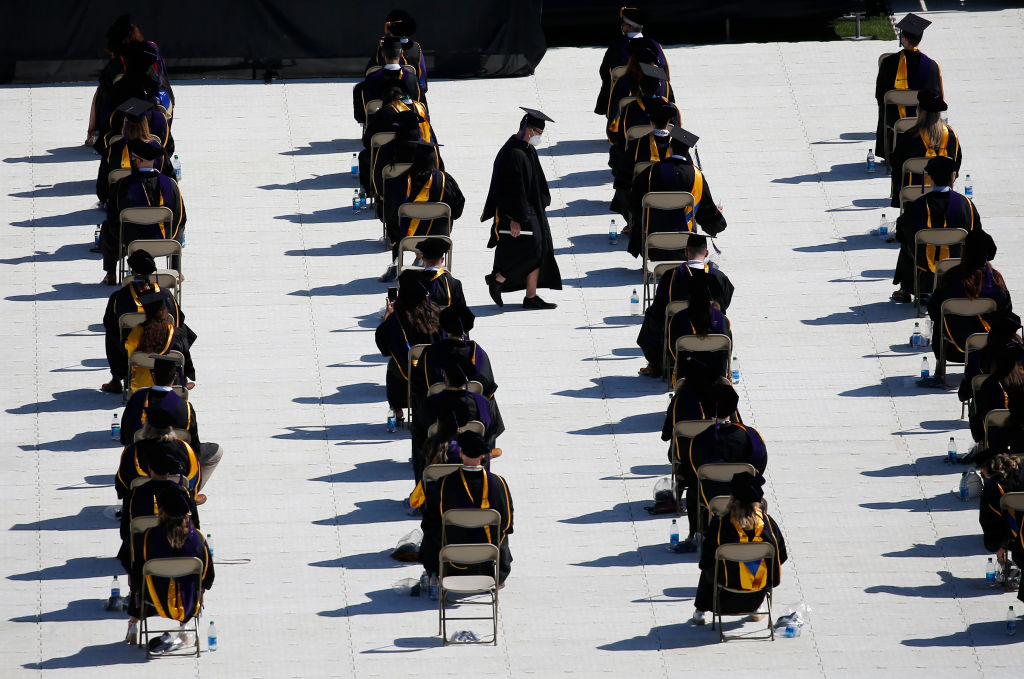Percentage of Americans With a College Degree
 Credit: Image Credit: Boston Globe / Getty Images
Credit: Image Credit: Boston Globe / Getty Images- About 44% of U.S. adults ages 25 and over have a college degree. That’s more than 100 million Americans.
- White Americans make up the overwhelming majority of degree-holders.
- The District of Columbia, Massachusetts, Colorado and Vermont have the highest percentage of college-degree holders.
As the popularity and importance of college have increased over the last several decades, so has the number of Americans with college degrees.
More than 100 million Americans ages 25 and over — about 44% of the total U.S. population in that age demographic — have an associate, bachelor’s, graduate, or professional degree, according to U.S. Census Bureau’s most recent data.
In 1940, when the census first asked questions about educational attainment, less than 5% of adults 25 and over reported they’d earned a bachelor’s degree or higher. By 2011, adults with college degrees of all types accounted for 36% of the population. This group has increased even further, by more than five percentage points, during the last decade.
Though the surge in degree-holding Americans over the last 70 years continues for now, a recent enrollment declines at postsecondary institutions could slow this growth in years to come. This is already being evidenced by the growing number of Americans with some college experience yet no degree.
Because of these slumps, caused by rising tuition costs, the COVID-19 pandemic, and a general decline in the perceptions of higher education among younger generations; we can reasonably expect a dip in the percentage of degree holders soon.
How Many Americans Have a College Degree?
Of the roughly 230 million adults over age 25 in the U.S., more than 100 million have earned some type of college degree. Below are details about educational attainment levels in the U.S. in 2021.
Educational Attainment by State
The following map shows the number and percentage of Americans with a college degree by state, according to the most recent American Community Survey by the U.S. Census Bureau.
The District of Columbia, Massachusetts, Colorado and Vermont have the highest percentages of adults with college degrees. In all four, over 51% of those 25 and over have an associate, bachelor’s, graduate, or professional degree.
Nearly all of these locations also fell within the top 10 states/districts with the highest rates of employment in the U.S. The District of Columbia had the highest employment rate in 2021, with about 71% of the population over the age of 16 in the labor force.
At the other end, West Virginia, Arkansas, Louisiana, and Mississippi had the lowest percentages of adults with college degrees. In each state, only about one-third of the adult population holds a degree in higher education. These states also had the lowest employment rates, with each falling under 60%.
Educational Attainment by Race/Ethnicity
There are clear disparities in the percentage of college degree-holders ages 25 and over among racial and ethnic groups in the U.S.
White Americans made up the overwhelming majority of those who hold college degrees in 2021, accounting for more than two-thirds of the group. Black, Asian, Latino/a, and Native American individuals combined made up less than 30% of the population 25 and older who have earned a college degree.
This lack of equity in educational attainment has become increasingly concerning to experts because of its direct effects on employment and opportunities for people of color throughout the country.
Educational Attainment by Gender
Women accounted for the majority of college degree holders among Americans ages 25 and older in 2021.
As of 2021, statistics on educational attainment and employment show that women are now the majority of college-educated workers in the U.S. They recently caught up to men in the workforce despite having been the majority of college-educated adults for more than a decade.
The Link Between Educational Attainment and Employment
Increased educational attainment directly correlates to higher levels of employment. But in addition to better employment outcomes, individuals with college degrees are also more likely to earn better wages.
According to the most data from the Bureau of Labor Statistics, the median weekly salary of an individual with a bachelor’s degree is 65% higher than the salary of an individual who attained a high school diploma.
So, if furthering your education is still something you’re not too sure about, keep in mind the increased opportunities for employment and higher wages it can bring.